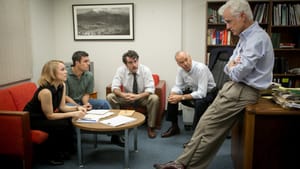Stay in the Loop
BSR publishes on a weekly schedule, with an email newsletter every Wednesday and Thursday morning. There’s no paywall, and subscribing is always free.
Unlocking omerta
Tom McCarthy's 'Spotlight' (first review)

I went to Catholic schools for 16 years, from kindergarten through college. During that entire time, I neither knew nor heard of anyone who was physically molested by a priest. The fact that it was happening all around me without my ever knowing about it testifies to the church’s power and its ability to keep secret a scandal that is beyond belief. The church’s decades-long omerta concerning priests sexually abusing children makes the Mafia look as permeable as the Nixon White House.
Spotlight tells the story of the reporters on the Boston Globe who unearthed the story of priests sexually abusing children. It all starts when an outsider, Marty Baron (Liev Schreiber) is named editor in chief for the newspaper. He asks the paper’s special investigative team, called Spotlight, to look into the story.
Headed by Walter "Robby" Robinson (Michael Keaton) and including Sacha Pfeiffer (Rachel McAdams), Michael Rezendes (Mark Ruffalo), and Matty Carroll (Brian d’Arcy James), Spotlight slowly pieces together the story. The quest for the truth is nearly impossible because of the cooperation among the judiciary, the police, the district attorney’s office, and, of course, the biggest player of all, the church. Even the victims are silenced by their own sense of shame and, more importantly, their incoherence, since many turned to alcohol or drugs to ease their pain.
A troubling pattern
Faintly at first, a pattern emerges: The priests preyed upon boys (and some girls) who were from poor, often broken homes. Spotlight tries to gauge the extent of the abuse by contacting a usually talkative source, the victims’ attorney. Mitchell Garabedian (Stanley Tucci) represents dozens of victims, but he is silenced by court orders of confidentiality. Slowly, the Spotlight team finds victims willing to talk and evidence that the abusive priests are not just a few bad apples, but a whole basketful, almost 90 in Boston alone.
Throughout the movie, the viewer is unsure which characters want to get to the truth and which want to hide it. The news editor, Ben Bradlee Jr. (John Slattery), has the pedigree for an editor who will stop at nothing to get the story, but continually expresses his doubts about the importance of the story and the veracity of the victims. When the Spotlight team takes Baron and Bradlee proof that the abuse is widespread, Baron refuses to run the story until the team can get proof that the church hierarchy knew the extent of the abuse and tried to cover it up. Meanwhile, we see subtle references that every week the story remains untold, more children are suffering at the hands of abusers in white collars.
Maintaining tension in a story we know
Spotlight is well-acted and expertly dramatized. Like All the President’s Men, it tells a dramatic story from the reporters’ point of view. As the story unfolds, the drama is heightened by each new revelation, even though it is a story the outcome of which we already know. Director/co-screenwriter Tom McCarthy does a fine job in handling the complex pattern as each reporter tracks down different leads. All the while, the paper’s editors are squeezed by different parts of the vise that the Catholic Church uses to keep the pressure on to drop the investigation.
The movie has two faults, the first of which is just an annoyance: McCarthy is incapable of avoiding the clichés of the newspaper drama. When the story finally gets printed, he cannot help showing us running printing presses and lines of newspaper trucks rushing from the bowels of the newspaper to spread the news.
The second fault is a little more troubling. While we may never understand why a man sexually abuses a child, we must wonder why the church not only decided to cover up the abuse but also continued to enable it by failing to prevent those priests who it knew were abusing children from continuing to do so. Spotlight takes a shot at answering the first question by having an unseen priest psychologist tell us that its cause is the vow of celibacy. He claims that over 50 percent of priests break that vow. Most priests are engaged in some form of cover-up about their own sexual activity, and therefore, there is a culture of omerta in place. But how a worldwide religious organization gets to the point where it cannot differentiate between consensual sexual activity between adults and child abuse is a story yet to be told.
For Dan Rottenberg's review, click here.
Sign up for our newsletter
All of the week's new articles, all in one place. Sign up for the free weekly BSR newsletters, and don't miss a conversation.

 Armen Pandola
Armen Pandola